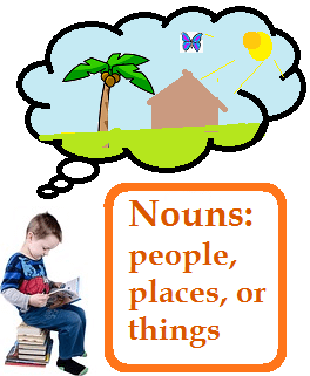Using English Nouns
English nouns tell us who or what we are talking about.

Nouns are words that name and classify people, places, things, or concepts. Examples of nouns: mother, child, Mary Smith, parents, beach, mountains, London, Korea, table, chairs, money, time, peace, and ideas.
(Proper nouns refer to a specific person or group, place, or idea. They are always capitalized: the Smiths, Queen Elizabeth, Microsoft, South America, Taoism.)
Nouns can be the subject of a sentence (the cause of action) or the ‘object’ that receives the action.
In the sentence “Mary hit the ball,” Mary is the subject and ball is the object. In “Tim took Mary to the store,” Tim is the subject, Mary is the object, and store is the object of a prepositional phrase.
(For more on sentence subjects and objects, see English Sentence Structure and English Pronouns.)
We make most nouns plural by adding –s or –es at the end. There are a few very important irregular plurals:
- child/children,
- person/people,
- man/men,
- woman/women,
- tooth/teeth,
- foot/feet.
(There are also a few strange animal plurals: mouse/mice, goose/geese, and deer/deer. Then we have 'dice' as the plural for 'die'-- a small cube rolled in some games. We almost always just say 'dice.')
A few words have no singular: pants, jeans, scissors. We can call one item of these a ‘pair.’ (“He put on his pants.” “He wore a new pair of pants.” “Please pass me the scissors.” “Please pass me a pair of scissors.”)
Count or Non-Count Nouns
Most nouns can be counted: two boys, four cities, 100 schools.
“Non-count” (or “mass”) nouns do not have a plural form (as normally used). There are several types:
- abstract ideas (time, money, knowledge, advice, health, happiness, etc.),
- liquids (water, tea, coffee, soup, or milk),
- some materials like wood, metal, or cloth,
- or tiny things like sugar or grains of sand that we would not count or handle individually.
Instead, we speak of a cup or gallon or box (or another container) of rice, juice, or other liquid or bulk items. (Sometimes people say, “Bring me two coffees,” but they mean two cups of coffee.)
We also rarely say ‘breads’ or use the plural form of individual kinds of meat. Instead we talk about a slice (piece) of bread or a loaf of bread, pieces of chicken or a bag of chicken parts or a whole chicken. (‘Chickens’ refers to the birds, not their meat.)
We ask for a leg of lamb, pork chops, beef steaks, or fish fillets. We also talk about the packaging or weight. We want a box of rice and a pound of hamburger.
We have a couple of adjectives that can only be used with countable nouns. Two others only work with non-count nouns. We use 'few' and 'many' with count nouns, and 'little' or 'much' with non-count: ('A lot' works with both types. So do 'any' and 'some.')
Examples:
"How many apples do you have?" "I don't have very many; only a few."
"How much milk do we have?" "We don't have much; just a little."
"Do you have any extra books?" "Yes. We have a lot. Would you like some?"
"Did you have any extra money after you paid the bills?" "Yes. We had a little left. Do you need some for class?"
"How much time is left?" "Not much! Hurry!"
Quick Quiz: Which of these are Nouns?
|
|
sky, blue, think, thing
home, little, boy, door
book, rain, sun, sunny
hand, coat, walk, sand
Spain, Spanish, flower, go
Did you choose sky, thing, home, boy, door, book, rain, sun, hand, coat, sand, Spain, and flower?
You’re right! Those are most commonly used as nouns. If you said walk, you are also right, or if you felt rain is a verb. Many words in English can serve as different parts of speech. It depends on how they are used. For example:
“I write with my left hand.” (‘Hand’ is a noun here.) “Please hand me the papers.” (Here ‘hand’ is a verb.)
“I like to walk.” ('Walk’ is a verb.) We took a walk in the park. (‘Walk’ is a noun here.) In fact, whenever we use ‘a’ or ‘the’ we’re talking about a noun, although there may be an adjective or two between them: a beautiful green coat.’ (‘Coat’ is the noun.)
‘Run’ is usually a verb, but in baseball, it can also be a noun. “Home’ is usually a noun, but in ‘home run,’ ‘home’ is an adjective describing the kind of ‘run.’
The good news is that you don’t need to memorize which words are English nouns or verbs (or both.) Just remember that English is a very flexible language, and notice the way people use it.
The more you listen and read in English, the easier it will be to use it correctly yourself.
English Sentence Structure and Word Families show how English nouns (and other parts of speech) fill their places in sentences.
Home > English Grammar Lessons > English Nouns.
Didn't find what you
needed? Explain what you want in the search box below.
(For example, cognates, past tense practice, or 'get along with.') Click to see the related pages on EnglishHints.
| site search by freefind | advanced |





